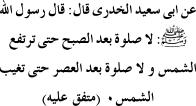Navigation: [ Back ] [ Up ] [ Next ]
There are three times during which it is forbidden
to pray any salât at all or to perform sajdah tilâwah (prostration
during recitation of Qur’ân): at sunrise, midday and sunset. However, if for
unavoidable reason, one is late in performing ‘Asr, it is permissible to pray
it although it will be makrűh. Thus, Hadrat ‘Uqba ibn ‘Âmir (Allâh be
pleased with him) reported:

Three were the times at while Allâh’s Messenger
(
 )
forbade us from praying or burying our dead (ie. funeral prayer): when the sun
begins to rise until it is fully up; when the sun is at its height until it
passes the meridian; and when the sun begins to set until it is completely set. [M-1040,
from Muslim]
)
forbade us from praying or burying our dead (ie. funeral prayer): when the sun
begins to rise until it is fully up; when the sun is at its height until it
passes the meridian; and when the sun begins to set until it is completely set. [M-1040,
from Muslim]
Furthermore, besides than the 2 sunnah of
Fajr, no other nafl should be prayed in that time (it is makrűh).
Also, no prayers should be offered after the fard of Fajr until
after sunrise. And similarly, no prayers should be offered after the fard
of ‘Asr until after sunset. During these times, however, it is permissible to
offer qadâ (makeup for missed prayers) or sajdah tilâwah.
[BZ p.10-12]
The Prophet (
 )
said:
)
said:

“There is no prayer after the Fajr until the sun (sufficiently) rises;
and there is no prayer after the ‘Asr until the sun completely sets.” [M-1041,
agreed upon]
Navigation: [ Back ] [ Up ] [ Next ]

![]()